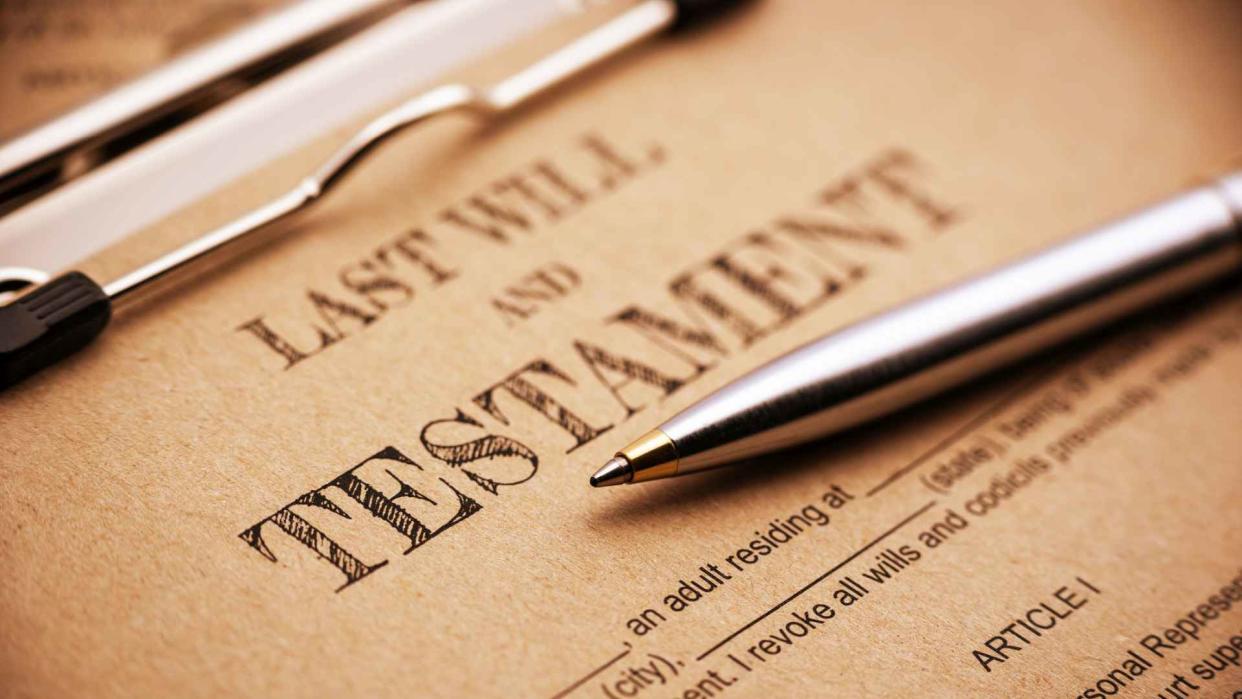6 Ways Not Having an Estate Plan Can Cost Your Heirs Money

While you may not want to think about the end of your life, doing so in advance is actually one of the kindest things you can do for yourself and your heirs.
Even if you don’t have a big or complex estate to leave behind-your beneficiaries and heirs will likely have to handle your affairs in your absence, and even if you become incapacitated while still alive.
An estate plan protects everyone and reduces the costs associated with loose ends. Experts explain some of the ways that not having an estate plan can cost your heirs.
Also learn when you should start estate planning.
Trending Now: Net Worth for Baby Boomers: How To Tell Whether You’re Poor, Middle Class, Upper Middle Class or Rich
For You: 4 Genius Things All Wealthy People Do With Their Money
Legal and Court Fees
One of the most common types of fees heirs will have to pay if there’s no plan are legal and other court fees, especially if there are family disputes about anything you’ve left behind.
Katie Lewis, a family law attorney, said she’s seen clients who ended up spending thousands of dollars in legal fees and court costs, simply because a will was ambiguous or non-existent.
“This often leads to family disputes [and] delayed asset distribution and can significantly erode the value of the estate,” she said.
In one case, where a parent passed away without a will, the absence of an estate plan led to severe conflicts among siblings regarding asset distribution, she said.
“This not only strained their relationships but also resulted in a prolonged probate process that decreased the estate’s value due to mounting legal and court fees,” Lewis said. “Furthermore, without specific directives, significant tax implications arose, costing the heirs a substantial amount of potential inheritance.”
Read More: I’m a Financial Advisor: Here’s Why My Rich Clients Identify With the Middle Class
Court Supervised Administration Process
If the phrase “estate plan” sounds like it doesn’t apply to you, David DuFault, an estate planning attorney and principle with Sodoma Law, suggested to just think of it as a last will and testament.
When a person dies without having one, it means you did not define in writing who should inherit your assets — financial and otherwise — and who should supervise the process of administering the estate, otherwise known as an executor.
If you don’t create your own, the state you live in will determine for you who these individuals are and what the disposition of your estate should be, he said.
“When this occurs, your family or heirs may be faced with the additional expense of a court-supervised administration process, additional costs associated with bonding requirements for appointed parties and just the simple fact that these intestate processes can be inefficient. Executing a last will and testament can help alleviate this inefficiency as well as reduce costs.”
Confusion Over Beneficiaries
Additionally, an important part of an estate plan is having your beneficiary designations in place and up to date, DuFault said.
“Failing to have a beneficiary named — or not updating one when appropriate — could cause assets that would ordinarily pass without going through probate to now be subject to that process,” DuFault said.
This can make your assets vulnerable to creditors as well as incur additional court costs.
“If retirement plans are involved, not naming a beneficiary — or not keeping it up to date — could result in a shortened withdrawal period for your heirs, leaving them to face potentially higher income taxes on withdrawal,” DuFault said. “And, if those accounts become subject to probate because of a beneficiary failure, those assets could also be subject to creditors and incur added probate expenses.”
Paying For Your Care
Not every aspect of an estate plan is just for your heirs either, it can also include your own end of life care, DuFault said.
Additionally, if you haven’t planned for the costs of your care, your heirs may have to foot these costs.
“Such a plan could include documents such as power of attorney, a will and a trust, but might also need to include discussion about beneficiary designations, as well as joint ownership or titling,” he said. “Failing to adequately plan for your death can both complicate affairs for your heirs and increase expenses, some of which might not be ones you would consider.”
Improper Tax Preparation
An estate plan does more than guide the distribution of your assets after your death, according to John F. Pace, certified public accountant (CPA) and partner at Pace & Associates, CPAs. It also provides critical tax planning strategies that can safeguard your estate from excessive taxation.
“Lacking such a plan can strike a severe blow to the estate’s value from both probate costs and tax liabilities,” Pace said.
He gave an example of how, without effective estate planning, the heirs of one client faced an inflated estate tax because essential tax planning measures, like setting up trusts or gifting strategies, hadn’t been implemented.
“This oversight reduced the net wealth passed on significantly,” he said.
General Frustration
Another “cost” of not having an estate plan is leaving your heirs in a state of confusion as to what your wishes were and frustration over how this aligns with what could be competing wishes amongst them.
[P]recise, informed estate planning not only [minimizes] tax liabilities but also ensures that wealth transition aligns with the deceased’s wishes without ambiguity,” Pace said. “Implementing strategic instruments like trusts, for example, can streamline asset transfer, provide tax benefits and protect against creditors and legal challenges that often deplete estate resources.”
Ultimately, estate planning not only allows you to identify your wishes for the disposition of your assets at death, it also potentially reduces the costs of your heirs financially and emotionally.
More From GOBankingRates
This article originally appeared on GOBankingRates.com: 6 Ways Not Having an Estate Plan Can Cost Your Heirs Money
